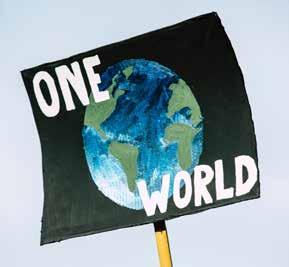
4 minute read
Eating as if the World Depends On It

by David L. Katz, MD, MPH
Advertisement
This column was adapted from this article
The mission of my nearly 30-year-long career in medicine has been doing all I can, with nutrition in particular, to help add years to lives and life to years. That mission has evolved over the past decade and a half for one fundamental reason: there are no healthy, vital people on a ruined planet. If we want to be healthy, vital people, we must pursue that aim on a healthy, vital planet- and in my view, all “health professionals” are now duty-bound to strive in every way possible- for that confluence.
A fair amount of my professional time has gone into clarifying what diet is best for health. In that effort, I am publicly pledged to favor epidemiology over ideology. In other words, I subordinate my personal preferences to the weight of evidence. I advocate for the dietary theme on the common ground of science, sense, and global expert consensus. The result is a periodic argument, albeit a very civil argument, with my colleagues, not just my adversaries. When, for instance, the more ardent proponents of vegan diets among my colleagues assert that eating wild salmon is toxic, I quip back: yes, for the fish. The epidemiologic evidence shows consistently and overwhelmingly that there is net health benefit for people in eating fish, omega-3-rich, fatty fish such as salmon in particular. We do not know if that benefit extends to optimal vegan diets or is only because fish is generally displacing meat from mixed diets. There really is no evidence to support the claim that eating wild salmon is toxic for people.
But it is indisputably toxic for the fish. And in a world awash in adult Homo sapiens making ever more hungry baby Homo sapiens and running out of wild salmon, the disagreement is increasingly moot. When there are no wild salmon left, it will no longer matter if we would have been better off including them in, or excluding them from, our plantpredominant, whole foods diets.
I have heard the more dedicated proponents for Paleo diets among my colleagues argue that humans are adapted to eat meat. That may be true, but what meat? Feeding time in the lion compound does not involve hotdogs or pepperoni. If we want to invoke our omnivorous adaptations as a reason to eat meat, it must be applied to the relevant articles. Those would be game animals, not the processed parts of their incarcerated, domesticated counterparts. So, maybe we are adapted to eat game. But for nearly 8 billion Homo sapiens to do so would require roughly 15 times the surface area of the Earth. So Stone Age eating, too, is mostly moot.
Gertrude Stein famously said: “a difference, to be a difference, must make a difference.” For dietary guidance to make a difference, it must be responsive to the world as it is- and not given over to pie-in-the-sky.
The world as it is involves diets excessive in animal food and ultra-processed foods contributing to unending pandemics of premature death and chronic disease. (Along with cardiometabolic risk factors that made the toll of the COVID pandemic far graver than it needed to be.) The world as it is involves cruelty and abuse of billions of “factory farmed” animals that have awareness and sensibilities much like those of the family dog. The world as it is involves destroying the glorious icons of Nature…to feed the world’s appetite for hamburgers. When we share the crucial truth about food with one another, these realities of “now” are the relevant context.
We have eaten up many of our choices, and the options that will allow us to keep eating - and for our children and grandchildren to do the same - are dwindling. This, too, is among the fundamental truths about food: It can run out.
That there are no healthy people on a ravaged, unhealthy planet pertains directly to the view of nutrition through the lens of public health. This is the urgent message of our time.
The basic theme of healthful eating – food, not too much, mostly plants - is rooted in common ground, and enjoys the support of experts with predilections ranging from vegan to Paleo and everything in between. Whatever disagreement there may have been about eating most if not exclusively plants, based only on the imperative of human health fades to insignificance as the urgent defense of our imperiled climate and planet conscripts us all. How we eat makes a difference to health beyond the limits of our own skin. We should now be eating diets based predominantly, if not entirely, on whole, plant foods as if the world depends on it.
Because…it does.









